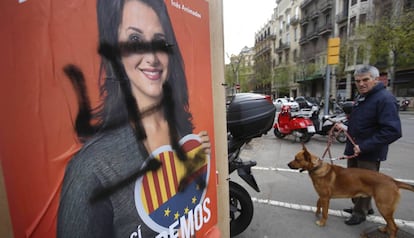Catalan campaign marred by harassment of anti-independence parties
Experts say that region is polarized like never before, and warn of threat of low-level violence

Catalan political parties that oppose independence are being systematically harassed, adding a layer of tension to an already strained campaign ahead of the December 21 election.
The headquarters of Ciudadanos, a reform-oriented party that is riding high in the polls and could be the most-voted in the ballot, has been attacked 14 times so far this year. The Catalan Socialists (PSC) have reported 10 attacks on their own HQ.
The ghost of the two communities is back
Josep Joan Moreso, UPF
Candidates themselves have been the target of threats and insults on social media and at public events. And recently, a group of young Socialist activists who were putting up campaign posters were assaulted by secessionists.
Experts are talking about a society that is “polarized like never before,” and warning that all these incidents are “the preliminary step” towards a situation of low-key violence.
The recent incident with the PSC campaign volunteers illustrates the situation. Fifteen of them, aged 17 through 24, had gathered at midnight at the PSC headquarters of Hospitalet de Llobregat, Catalonia’s second largest city (254,000 residents). They split up into three groups to put up posters of Miquel Iceta, the Socialist candidate for the Catalan premiership.

Daniel Martínez, a 24-year-old history graduate and first secretary of the local PSC youth group, was in one of the groups. At 12.15am he received a call on his cellphone: “Dani, please come quick! Secessionists have insulted us, taken our posters and hit us! They screamed: ‘We don’t want socialists in Hospitalet! Get out of here! Visca la terra lliure! (Long live the free land, in Catalan)”.
When Daniel Martínez arrived at the scene, he found his young colleagues shaking with fear and anger. An underage girl had been shoved against a wall. A young man who had refused to stop putting up posters was punched and kicked in the chest.
“The oldest members of the party tell us that there hadn’t been this sort of street aggression in the last 40 years,” says Martínez. “And we believe that what lies behind this escalating violence is secessionists’ frustration at the possibility of losing the elections.”
The oldest members of the party tell us that there hadn’t been this sort of street aggression for 40 years
Daniel Martínez, PSC youth group leader
The party’s organization secretary, Salvador Illa, notes that “ever since September there has been a social tension that’s visible in the marches, in the political language, in the attacks against party HQs and in the harassment against candidates and mayors. That is why we are asking everyone not to contribute to this situation.”
Santi Rodríguez, secretary general of the Catalan Popular Party (PP), talks about isolated cases of harassment.
“In broad terms there is not enormous pressure, but there are incidents such as the one involving Andrea Levy,” he says, alluding to a party official who was accosted by several individuals in Sant Fos de Campsentelles (Barcelona). As for the attacks on social media, Rodríguez says they have become “immune” to them, but these range from death threats against the PP candidate Xavier García Albiol to a variety of insults. “And ‘fascist’ is the mildest one...,” he notes.
Pissed off
“The mood is tense, and that is the step before low-intensity violence,” explains Oriol Bartomeu, who teaches political science at Barcelona Autonomous University (UAB). “The contact points between people who think differently have disappeared. Now we have groups of people who think the same way, and who get their feedback from like-minded news organizations and social media. This reaffirms their own hate towards those who think differently. And this ends up creating violent incidents.”
Bartomeu talks about “a pissed-off society” where everyone lives in his or her own “bubble,” a society that has embraced “a rhetoric of hate and humiliation” and developed a tolerance for verbal violence. And this “is politically profitable.”
“The ghost of the two communities is back,” laments Josep Joan Moreso, a professor of philosophy of law and former head of Pompeu Fabra University (UPF). “Catalan society is polarized like never before. I would like to hope that things won’t get worse, but I’m not sure, because people’s [political] positions are very inflexible.”
Victoria Camps, a professor of moral and political philosophy at UAB, strikes a more positive note: “The banner of the independence camp is peace, and I doubt things will get worse.” But she adds that the situation could “get stuck” depending on political parties’ attitudes after the election.
This newspaper tried to reach secessionist parties (ERC, Junts per Catalunya and CUP) to inquire about attacks against their own candidates or HQ, but either there was no response or spokespeople declined to comment.
Yet all of them had suffered some form of harassment as well. Former regional minister Joaquim Forn was insulted at El Prat airport, and the ex-premier, Carles Puigdemont, currently in Belgium, has received death threats on social media.
English version by Susana Urra.
Tu suscripción se está usando en otro dispositivo
¿Quieres añadir otro usuario a tu suscripción?
Si continúas leyendo en este dispositivo, no se podrá leer en el otro.
FlechaTu suscripción se está usando en otro dispositivo y solo puedes acceder a EL PAÍS desde un dispositivo a la vez.
Si quieres compartir tu cuenta, cambia tu suscripción a la modalidad Premium, así podrás añadir otro usuario. Cada uno accederá con su propia cuenta de email, lo que os permitirá personalizar vuestra experiencia en EL PAÍS.
¿Tienes una suscripción de empresa? Accede aquí para contratar más cuentas.
En el caso de no saber quién está usando tu cuenta, te recomendamos cambiar tu contraseña aquí.
Si decides continuar compartiendo tu cuenta, este mensaje se mostrará en tu dispositivo y en el de la otra persona que está usando tu cuenta de forma indefinida, afectando a tu experiencia de lectura. Puedes consultar aquí los términos y condiciones de la suscripción digital.








































